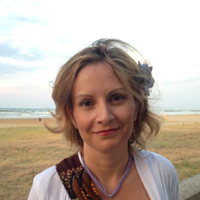 Alessandra Checchetto è stata dottoranda in “Psicologia, linguistica e neuroscienze cognitive” sotto la supervisione del Prof. Carlo Cecchetto. Partecipa al progetto SIGN-HUB (2016-2020): “Preserving, researching and fostering the linguistic, historical and cultural heritage of European Deaf signing communities with an integral resource.”
Alessandra Checchetto è stata dottoranda in “Psicologia, linguistica e neuroscienze cognitive” sotto la supervisione del Prof. Carlo Cecchetto. Partecipa al progetto SIGN-HUB (2016-2020): “Preserving, researching and fostering the linguistic, historical and cultural heritage of European Deaf signing communities with an integral resource.”
Si è laureata a pieni voti in Scienze Antropolgiche ed Etnologiche, con una tesi di ricerca sulla LIS tattile, la varietà di LIS in uso presso la popolazione sordocieca segnante.
Esercita dal 1998 la professione di interprete di LIS e LIS tattile, in ambito pubblico e privato. È socia di Anios, associazione interpreti di lingua dei segni italiana. Ha esperienza nel campo formativo, dove si occupa dei percorsi di formazione e aggiornamento di interpreti di LIS.
Dal 2011 al 2016 è stata docente a contratto di LIS tattile e Cultura dei Sordi presso l’Università Ca’ Foscari di Venezia.